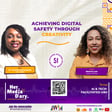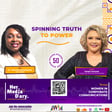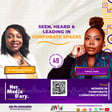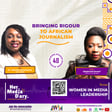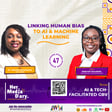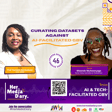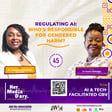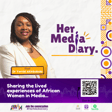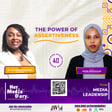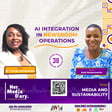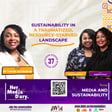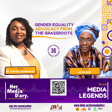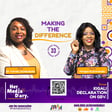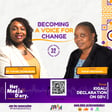Controversial TV Show Jokes
00:00:07
Speaker
Some comedians were making very disrespectful and very frustrating action on TV. So on that day, one of the media houses produced a kind of game. The game was, I Can't Tell You A Life, and it's a make-believe line. So what comedian says, once I had raped a girl, even I can show you how she was acting while I was raping her.
00:00:41
Speaker
Imagine a world where we have gender equality and equity in and through media. That is our mission at African Women in Media.
Introducing Dr. Emsi Akimobola and 'Her Media Diary'
00:00:49
Speaker
I'm Dr. Emsi Akimobola, your host, and this is Her Media Diary, a podcast that captures the lived experiences of African women working in media
Malcolm Selamon's Journey and Advocacy
00:00:58
Speaker
industries. In this episode, I'm joined by Malcolm Selamon, a journalist with over 15 years of experience and also a board member of the Ethiopian Media Women Association, also known as EMWA.
00:01:11
Speaker
Malcolm shares her inspiring journey from growing up in Addis Ababa to becoming a prominent journalist and advocate for gender equality in media. She discusses her early life challenges, her pursuit of education and her transition into journalism. She also highlights her work with the Ethiopian Media Women Association and her dedication to amplify women's voices through initiatives like the Kigali Declaration.
Understanding the Kigali Declaration
00:01:37
Speaker
Throughout this series, we'll be in conversation with some of the signatories of the Kigali Declaration on the Elimination of Gender Violence in and through media in Africa by 2034, which is an initiative co-designed with the African women in media community.
Life in Addis Ababa: Childhood and Changes
00:01:50
Speaker
And in these conversations, we'll find out how these individuals have implemented the tenets of the declaration in their work as media practitioners. By inviting these voices into conversation, we hope to provide solutions to breaking down barriers faced by African women in media.
00:02:21
Speaker
Malcolm, it's a pleasure having this conversation with you. I think I've been going to Addis for the every year, at least once a year for the last five years.
Family Dynamics and Childhood Memories
00:02:30
Speaker
And we've met a few times while I've been there. How's things in Addis? It's good. the Things are changing. The city is so fabulous with lights and new roads.
00:02:41
Speaker
Yeah, every time I go there, I feel as if there's something new, there's a new structure, a new development. It's really quite a significant kind of change over the years I've been coming to Addis. Did you grow up in Addis? Yes, I'm a girl from Addis.
00:02:55
Speaker
Okay, tell me about growing up in Addis from when you were young. It's very different from now. In my time or in that time, we were kids and we will play a lot as a kid. We play different kinds of plays. I was born and grown in one of the biggest village in Addis. It's called Lassafar or it's closer to Mercato, the big market. okay So we are fast from the other girls or boys from artists. So we are part of our village that we are closer to Mercado and we think that we are very smart and things like that. But most of the time we played. I remember that.
Family Structure and Social Challenges
00:03:37
Speaker
Nowadays girls are not playing. Whenever you saw them they are sitting touching their phones or something. At that time we don't have a phone. yeah So
00:03:47
Speaker
We had a great time as a children. We were playing, we visited our friends, and parents were also very and not happy that we are going out. There are punishments for what we did, I mean, for visiting friends, so playing outside for a longer time. yeah I know what you mean. and My daughters too are always you know on their phones, pressing their phones and stuff. Though, I mean, to be fair on them, they also do a few extracurricular activities as well. But um tell me about your family dynamic growing up. Okay. It was a different kind of family. It's not a usual one. What way? My mom, she had four children okay before her first marriage. So after that time, she met my dad and she was divorced. So ah she met him. He was younger.
00:04:35
Speaker
and she was educated at that time and she didn't went to school at all, but she was a great lady with a good heart and she was so beautiful. So they met and I'm the first born for my father. And my mom had four children before me from her first marriage.
00:04:55
Speaker
So her children, the boys, were like a brother for my father, a younger brother. So we had a great family. Everybody loves each other. My dad was a very great person. He really loves my mom. At that time, it was very difficult for um a woman to get married after having four children and to get married a younger man.
00:05:19
Speaker
in our country, it's it's not a usual thing. So his parents didn't accept her and her family as well. They didn't accept him and because he was getting only government salary, but her family had land and they were landlords. So they think that she left a rich man and going for someone who was, I think that, but they had a great life.
00:05:47
Speaker
And I was the only girl, so everybody was happy to have me. And my dad always tell me that I'm beautiful and clever and everybody. says that, and still I think I'm very beautiful.
Educational Challenges and Perseverance
00:06:01
Speaker
Yeah, of course. So it sounds like your mom was a bit of a trailblazer. How did all of that shape who you then became? Yeah, she, as I turn to a full end, she's a very different person. She's with all the minors and things. And she taught me that, especially minors, she was the one who punished me whenever I do something wrong.
00:06:25
Speaker
my dad I didn't ah hurt to touch me but I think she shaped me especially in my communications and at that time I was not happy about her punishment.
00:06:37
Speaker
I usually like accusing her of she was punishing me. I think that's the space I conquered her, especially when I see the new generation and other people with a loose family. So it says as well. But it was tough. She was punishing me. She selected my friends and the way she would always ah choose what I wear, especially when I'm under 18.
00:07:05
Speaker
and things like that. Everything has a discipline in our house. So I thank her a lot now because it gives me a discipline and ah it makes me a good communicator. yeah I listen to people and I respect elders in any way.
00:07:27
Speaker
elders in education, it it might be someone very educated, it might be someone elder. And that gives me a lot in my life. And how did you find yourself in journalism? Yeah, because I read and as a child, as I told you, my mom doesn't want us to go out and play with children. Sometimes I sleep out and play with children and I get my punishment. But most of the time I sit at home And rich that was ah all the only word for me and it gives me a lot. I mean, it widened my horizon. So I just want to tell people that are what I know, it was
00:08:11
Speaker
always something in my heart that I should have to tell them. People may not know this one, but they should have to know. and So I think that makes me, that's the reason behind telling stories to people. And most of the time, my dad always asked me to tell him what I read. And whenever the guests come to our house, oh, this is my girl, she reads a lot. So tell them what you read last time, is it like that? so It sounds like a very proud parent.
00:08:41
Speaker
very proud of your achievements. So did you study journalism? Did you go to university to study journalism or training or something? Yes, maybe it was foreign language and literature, but my MA is communication and journalism. Okay, and that was at the University of Addis Ababa? Yes, both in Addis. Tell us about that time of going to university, what was life like for you then in Addis?
00:09:05
Speaker
and doing the program. Yeah, it was not smooth. I just not joining the university as a regular girl because I had to have a child before I joined the university. I was the best student, but yeah, sometimes problems come and I got pregnant. So I should have to take my matric or ESLC, the Ethiopian school living exam.
00:09:34
Speaker
while I'm having a child. So yeah at that time, my friend is all going to the university, but I have to study one year and not directly to the university. I should have to college first because I'm lagging. So I should have to go into teachers education college. But I was so sad. And at the same time, I had a kind of courage that I should have to have.
00:10:03
Speaker
go to the university. So I studied art when I have my child. And because of my gold grapes, I can join the university the daytime, the regular university. So It was a very happiest time because I said I can achieve it. And I rewrite my story because that was the time that I may lost. If I didn't get the chance to get into university, I may lost. I can say that because I know many girls that when they have children, when they are in the high school, they just lose it. But God helps me and my teachers and family, they all support me to get into university again.
00:10:45
Speaker
So I think that's my great achievement.
From Marriage to Independence
00:10:47
Speaker
I mean, tell us more about that period in your life of getting pregnant and, you know, dealing with all of these wider issues. What was that like for you? If you want to talk about it, obviously. Yeah, because I think it's maybe a lesson for a girl. The thing is I should have to get married at that time because my mom, I told you she was very strict over such things. So I got married to the man.
00:11:12
Speaker
and thanks God he was a good person that he allows me to continue my education. So I raised my child, he helped me, he hired me, a maid to help me and I need to get to and also there is a mother-in-law so she helps me so that I can continue the college education so that I can read and then I join the university.
00:11:40
Speaker
there was so much help. I didn't live that long. My mom also because I get married, so she's happy. So she came in. But how did you feel though about having to get married because of of getting pregnant? Yeah, it it was not something that I can accept it. So I live in the university. I don't go to home usually only on the weekends and I see my child at that time and he go up.
00:12:08
Speaker
after the college he grown up. So even if they can decide to say take him to the university, in my all my friends will help me
Transition to Journalism and Gender Advocacy
00:12:16
Speaker
be with him. And everybody knows that I have a child at that age. So when I'm a third year university student, I talk to my husband that I cannot stay in that marriage right because I don't have anything in my heart. And it's wrong that when I'm feeling that way, I cannot stay in that marriage because I i don't accept it from the start. So I told him that I don't need anything. Anything that you have is yours. I don't want to share it. Even though I that, I said, I don't want. So he accepted that and we divorced it.
00:12:55
Speaker
So families were not happy, so the problem started date at four years after my graduation. I started living with my child. I started teaching in my child's school. So that's to avoid the payment for him. So I started living by myself.
00:13:16
Speaker
immediately after graduation, with my child. Yeah. I mean, that speaks a lot about your bravery, especially in the context that you're in, right? Being able to kind of stand up to the circumstance and to do what you felt you needed to do for yourself. And I'm curious to know how you then transitioned from kind of that period to working in journalism. Yeah. After being a teacher, since journalism was in my heart, I really liked teaching children.
00:13:46
Speaker
I love them, I wasn't doing that. And most of the time I do reading for the children and they really, I think that really helped them to be readers. Most of the children I taught were reading, they bought books from their home. So I'm really proud of that time. And my child also, he is a great reader. Every time he said that, you say you give it to me, he said. And now he's a doctor by the way, a medical doctor.
00:14:14
Speaker
Wow, that's amazing. It's just like a friend for me. yeah yeah and Because he's reading, that's all. So after that, when one one of the prominent radio stations announces that they want a reporter. So I i app applied there. There had been a lot of people, but they picked me, guided me. So I started working there. At that time, it was only a radio station. It was almost the second radio station in Ethiopia. It's named FANA, Radio FANA. So I was doing well. I really liked my job.
00:14:55
Speaker
I loved it. So that was how was I started my journalism career. Okay. And so you've also been really involved in the work around gender equality in media. You're a member of EMWA, so that's Ethiopian and Media Women's Association. How did that journey come about? Okay. After joining Radiofana, I got married and have children and was tough, but I was working. So you later got married to somebody else? Yes. OK. I've got two other sons. And during that time, since the radio station is ah politically affiliated, it was difficult for me because I'm not a person in politics. I really like literature, literature music and things like that. So is they assigned me only to do the artists program.
00:15:45
Speaker
and music selection and culture and things like that. But afterward, yeah I should have to quit because I don't like the way that things go in there. Because as I told you, there was politics in there. It's a kind of male dominated. So I left it and I started my own business for two years, actually.
Impact of the Kigali Declaration
00:16:07
Speaker
And then I joined the BBC media action. They also come to Ethiopia and they said they want some journals to send an applet and they accepted me as a producer and it was a life-changing situation for me. it That is where I found the right journalism, how to practice it. So I really like it professionally. They were giving me plenty of trainings, production trainings, media leadership, you can name it.
00:16:39
Speaker
and It was a real journalism there. So I really like it. in other Fortunately, they had a maternal child radio show. So that I was the host and the producer for that radio show. I should have to go all over the country to collect audio materials and to meet Ethiopian women, rural women, very poor, with chalines. And I can't see the real Ethiopia and the real women.
00:17:08
Speaker
So I start feeling about women starting from that time because as I told you, I'm a girl, a city girl, and I think that I can't choose anything. I can't live anything. I can't live myself. So that was a different story. 80% of the women are living in darkness. I can't say that. So it was a heart-touching and it changes all my thinking about women and challenge. I see.
00:17:37
Speaker
very challenging story so that I decided to work all the old women and women. So whenever there is other programs coming, I always ask, where is the women? How could we include women in this program? So I ask that question. And I ask myself, what can I contribute? Because worrying and stressing is not the only solution. So I should have to do something with my profession. So that's how I started.
00:18:07
Speaker
Hello, media diary listeners. Our permit me to introduce you to the Kigali Declaration on the Elimination of Gender Violence in and through Media in Africa by 2034. And we here at our in college, the Kigali Declaration. It's a groundbreaking commitment by African women in media to bring gender equality representation and respect into every news from across the continent. By signing up media organizations, professionals, platforms, regulators, and academics are pledging to tackle gender biases, amplify women's voices and create safer, more inclusive work environments for everyone.
00:18:45
Speaker
Imagine a media landscape that treats every story of balance and every voice with dignity. Adopting the Kigali Declaration isn't just a commitment, it's a powerful step forward towards social change and it starts with you and I. If you're ready to be part of this change, visit the official Kigali Declaration website at africamomaningmedia.com slash declaration to learn more and to sign up.
00:19:12
Speaker
So you are one of the signatories to the Kigali Declaration, which we adopted at the conference last year. So the full name for our listeners is Kigali Declaration on the Elimination of Gender Violence in the Through Media in Africa by 2034. It's a mouthful, but it's really important that we get all those words in there. And you are one of the signatories to this, right? And it was adopted in Rwanda at the African Women in Media 2023 conference. So tell me what does especially when you reflect on what you've been saying about how reporting on the experiences of Ethiopian women in different parts of the country shaped your interest around gender equality.
00:19:54
Speaker
What does the declaration mean to you and your work as a woman, but and also in this kind of you know dedication to telling women's stories? Yeah, this is a really good question because I really find it very meaningful, the declaration, especially in our context, the Ethiopian context. As I told you, 80% of Ethiopian women are living in Dara, and many of the women working in women are city girls.
00:20:21
Speaker
And the media practitioners say that in Addis, many media stations are in Addis. So I always feel that the story of, za the real story of women are not covered. And the real issue, you cannot see or hear or listen in our stations, in our TVs, about the real challenges of Ethiopian women. So having this declaration and adopting this declaration into Ethiopia,
00:20:51
Speaker
means voicing the challenges of those women, the 80%. So it's very meaningful and I'm really proud of ah to be one of the signatures. So tell me some of the things you've done as a result of kind of being a signatory to it and the way in which it resonates with your context. Okay. As the Ethiopian Media Women Association's board, first of all, the things that we do or I do is putting this declaration into light that there is this declaration so you should have to know and we need to adopt this to our country's context. This is one. And the other thing, most of the time we invited in the medias for different reasons related to women and media and harassment and things. So whenever I'm being a guest in a film station or an television program in something, I raise
00:21:50
Speaker
the issue of the declaration and that we need to adopt. And I also involving as a women organization as a GA, for instance, for Timran, it's a women's political participation, affiliated organization, um the General Assembly head for that association.
Malcolm's Radio Show and Women's Empowerment
00:22:11
Speaker
So in that association, I raise about this declaration. Okay. Yeah.
00:22:16
Speaker
Malcolm, you have to help me pronounce your radio show. Is it Yemechesh? Yemechesh. Yemechesh. Yes. Sounds like my name, Yemechesh. Yes. What does it mean?
00:22:31
Speaker
Let you be comfortable for a woman. It means what? Let you be comfortable. Let you be comfortable. Okay. Okay. Interesting. It sounds like the same pronunciation as my name. Yemechesh. Yeah. mishe yemai yeah yeah So so tell tell us about that radio show, what was the focus of of that radio show? Yeah, even starting from the name, it's not and my name Akjali, it's a radio station's owner. She is a woman, a great woman. She gives us a move of the program. So it's a kind of way to start with naming. It's something things that people say to each other. ah For instance,
00:23:14
Speaker
If yeah I ask you something, I ask you to go out and you said, no, I'm not feeling good. Okay. Immatish, I said. As you wish. ah For your comfort, for a woman. Yeah. As you said. Like, do do what makes you feel comfortable. Yes, that is up okay. okay that results definite So is this is it. And it's been seven years.
00:23:41
Speaker
for the radio show started. For the first two years, there was another girl running the radio show. But after two years, the radio show owner was headhunting. So I was doing my MA paper.
00:23:57
Speaker
on how radio programs can be entertained, especially the development of radio programs. And in relation to my radio, first radio show, Jumper, the Matar Matar, will turn the radio show. So when she saw the paper, she really likes it and she called me directly and said, do you want to make a radio show just like your former? And I was very happy.
00:24:21
Speaker
over the moon. So tell us what this show was about and also just the process of you getting started with this show. Yeah, the whole idea is the thing that I told you before. Since the radio show is a women's radio show, which funded by Melinda and Gates Foundation, it's a women's issue. Women's health, women's empowerment, women's education. So it's focusing on these issues. So they show me what the program needs from us. So, she said many of the programs are covering panel discussions, workshops, and things happening only in Addis. But I need the program to go out of Addis and to bring issues of human of their own.
00:25:12
Speaker
that's my thing exactly right especially given your previous experience going out around the Ethiopia yes that's exactly a job fitting my experience and my interest yeah So I was very happy to accept that. So I started from collecting stories from places where conflict are and how women were armed by this conflict and especially women in business. In rural, women are very strong, in some especially in the southern part of Egypt. ah Women are very active in making business and making their own money. But those conflict are
00:25:53
Speaker
devastated and women were running away from their places and they go to an another place. So I start my stories with those women, IDPs internally displaced women. That was my first story. So the program's focus is to put some light on the challenges of women and then ah inviting experts on that.
00:26:20
Speaker
and making the program in relation to human rights and in relation to political participation related to access to health, access to education. So it's a magazine format program. So I bring stories from the worldwide and I invite experts. I do literary works, poems and musics also within the program. It's a 55 minutes weekly radio
Gender Bias in Media Content
00:26:48
Speaker
and it had a repeat on Sundays, so many people had a chance to listen to it. yeah So I had been producing it for five years or six years and now it stopped. But I'm trying my best to continue. That's interesting.
00:27:06
Speaker
and I remember when I was in Addis earlier this year, so I recently came back last week from Addis actually, but I was also in Addis in August. And I remember then there was an opera about a young girl that had been raped and the story was on media, but it's something that happened a while back. So in the time since you had that radio show and those kinds of conversations around gender-based violence, how would you say those kinds of conversations have evolved in terms of
00:27:37
Speaker
media coverage and discussions around gender-based violence experienced by women and girls. Yeah. Unfortunately, we don't have much platforms to entertain such kind of stores. Even this radio show, I can say it's the only one lasting this long. Many of the women's radio shows are project-based radio shows, so that some donors give money and then the project team say attempts. This is a store. Even you metish After seven years, it stopped because of the funding. So it's very sad. But nowadays there are some young women starting YouTubes and TikToks so that they can talk about these issues. It's becoming digitalized. So the digital platform helps us to bring out such kind of stories. That's why we can listen more stories, this something like that.
00:28:37
Speaker
But all in my radio show, yes, i I did cover such stories because when the program starts, we had a kind of news stories for five minutes or six minutes. So we raised those issues and that even the focus of the programs most of the time is depending of the issue, how hot it is. So it can be the whole store. We can invite guests or we can make it phone in.
00:29:06
Speaker
on such occasions, we ah make the programme following so that people ah start calling and the expert sits in the studio with me discussing. So we did ah cover such kind of stories.
00:29:23
Speaker
And as I said earlier on, you're a member of the Ethiopian Media Women Associations, which we call EMWA, right? And I imagine they've been playing such an important role in getting us to have those conversations about the experience of women in media, but and also in terms of coverage of experiences of women and girls as well. So how would you describe some of your work in this activism environment in terms of trying to do things like encourage organizations to implement the Kicala Declaration, have media gender policies, and are you seeing any impact of this work?
00:29:55
Speaker
Yes, especially the media gender policy issue is a big issue. taste Many of the women organizations know about it. They know about it and they want to collaborate with Emor to implement it. Before the issue of this girl, there had been another issue in one of the TV stations in a holiday. Some comedians were making very disrespectful and very frustrating action on TV, on a holiday day. they They said it was a game, but they said one of the comedians show, he raped her and how she acted when he raped her. And they were laughing. No, on national TV, like, wow.
00:30:43
Speaker
Well, it had been last year on a Christmas day, for us Christmas is January 7. So on that day, the one of the media houses ah produced a kind of game and the famous comedians had been part of that game. So the game was I can do a bit of life. I can tell you a lie and it's a make-believe lie. So what the comedian says, I had been, once I had raped a girl, he said, and they said, wow. And he said, for your concern or for your information, even I can show you how she was acting while I was raping her. The next day, all the women main organizations, including the group Emilia Association,
00:31:36
Speaker
make a press release. So we cannot stand such kind of discarding contents in our medias, especially on holiday day, parents, children, we are watching that TV. It's very disregarding. So we did that. And we continue with other media platforms, they have invited us as a media, we made a decision. So we explain what this means and how we can we should have to collaborate with other women organizations and we need this is the reason why we need to have a gender policy in our media houses so that's
00:32:20
Speaker
I think a perfect fit for our gender policy because it was a vague idea. But we really understand and where we need such kind of policies so that we also introduce this gender media policy for other women organizations.
00:32:38
Speaker
um I mean, it is really outrageous how that individual thought that it was okay to say things like that on the TV, but it's because of this normalization of some of these, of things like that, right? so And the fact that he clearly didn't see it as anything wrong, but it was, it's, you know, to see organizations like yours be available to react in the way that you can, that's
Implementing Gender Policies in Media
00:33:02
Speaker
really important. But my question really now is about,
00:33:05
Speaker
Because you mentioned gender policies and the role it plays in addressing this kind of content, right? But from our experience, we see that there are several organizations that start gender policies, that promote gender policies, and that doesn't necessarily equate to implementation and being accountable. When you reflect on that incident and perhaps others that you've encountered and gender policies have been developed, what are your reflections on how to keep media accountable in implementing gender policies? That's really a a good question, because that is a problem. Even medias may have that policy and they may not implement it. But the reason why we need other women organisations is one of the reasons, because when we get stronger, when the women organisations working with governments for the
00:33:58
Speaker
We are planning to work with the Ethiopian Women in Social Affairs, Ministry of Women in Social Affairs, and also the regulatory body like the Ethiopian Media Authority. So we need to have this policy and then we have a good communication with them and they buy is this idea so that they can regulate it for us.
00:34:23
Speaker
so I think in that way, working closely with regulatory board and other ah strong women organisations, these things may change, I think. But are you saying that M1, your organisation, has worked with regulators to address in terms of gender policies?
00:34:44
Speaker
Yes, EMMA, it took immediate authorities, one of our partners in this work. And they are very happy when we told them that we are bringing this home away. And they said to her they are very positive to work with us. Right. Okay. So this is about the Kigali Declaration, right? Yeah. Okay. So can you maybe elaborate more on kind of things that have happened since then. so You bought the Kigali Declaration to the m regulatory authority in Ethiopia as a meaningful kind of community-led initiative.
00:35:19
Speaker
to tackle gender-based violence, representation in the media and also and within industry. So tell us some of the things that's happened as a result of that. As I mentioned earlier, we introduced this ah Kigali Declaration for women organizations and also the wider community, because the incident that's happening about the dog, I told you, is very close time when we get back from Kigali so is that when we invited in different media outlets like FM stations, other TV programs, we ah kind of ah got an opportunity to talk up about it so that people will be aware of that.
00:36:04
Speaker
So that, oh, why don't we take and adopt this thing in our organizations and ah in collaborations so that we can make change. So I think it creates something, a kind of ah tool or instrument for other women organizations as well.
00:36:24
Speaker
with a kind of loving job throughout this time. And I think that's very fruitful. And how do you maintain that momentum, right? So you started this process, this advocacy, and working with the Kigali Declaration, you know looking at gender-sensitive media policies. How do you maintain momentum in the advocacy work? Yeah most of the time issues like that are raised in our context as a country in conflict. Gender-based violence is a day-to-day for us because you can listen something very different from other part of the
00:37:04
Speaker
world in relation to GBV in Ethiopia right now. There is rape, women are getting killed by their spouses, brides killed even less than a week's time. So we have many occasions to talk about this declaration and
Future Hopes for Gender Equality in Media
00:37:25
Speaker
to id advocate it. So I think we have such kind of times that there is a kind of instrument, a kind of tool so that we need to adapt and we need to have to work with it. Yeah. Okay. So looking ahead now, what changes do you hope to see in Ethiopian media in terms of gender representation and the coverage of issues affecting women?
00:37:48
Speaker
Not in a very short time, but I hope awareness is created among female journalists. Awareness is created among media leaders. And most of all, this awareness is created in ah regulatory bodies like Emma and the media council. So I think there will come a time that all media houses will have or will adopt a media gender policy and that they will implement it at the same time, not only having it for just for the sake of having it, but they will implementing it since we are working with the ground up very strong, we are working with government in deserve strong women organizations. Absolutely, absolutely.
00:38:41
Speaker
So finally, for the young journalists and media professionals who are listening to to this podcast, what advice would you give them about using their platforms to advocate for gender equality and social justice, and also to implement and promote the Kigali Declaration on the elimination of gender violence in ethnic media in Africa? OK, thank you, Dr. Ebisi.
00:39:03
Speaker
The young generation should not be kept quiet about GBV in one place. GBV in media houses, because it is the worst place that should be happened. It should not be happened in media houses.
00:39:18
Speaker
and it should not be happened in in everywhere, but especially in media houses because it is a voice for other women, for a voice for the voiceless. Women or journalists working, especially the young generation working in media should have to voice or they should have to be very vocal about it. They don't have to be keep quiet a about the people from places like that.
00:39:46
Speaker
Okay. Well, brilliant. Thank you so much, Malcolm, for your time and your excellent insights from Ethiopia. and um I must tell you that I've been going to Addis every year for the last five years, and it's beginning to feel like a second home to me. So I'm really, really passionate about seeing things move in the right direction when it comes to gender equality and through the media in Ethiopia. So thank you so much for joining me on the podcast.
00:40:09
Speaker
Thank you, Dr. Remisi. Thank you for giving me such a marvelous chance. um Also, thank you. Thank you. All right.
00:40:23
Speaker
Malcolm's path to journalism was not a straightforward one. And you know, in many cases, that is the case. But despite excelling Academically, she faced personal challenges, including an early pregnancy. However, her determination and the support of her family enabled her to persevere, eventually leading her to the University of Addis Ababa, where she got a Bachelor's degree in foreign language, literature, and Masters in Communication and Journalism. A career in journalism began at Radio Fana, where she honed her skills and developed a passion for storytelling. However, it was her work with BBC Media Action that truly transformed her perspective.
00:41:00
Speaker
Travelling across Ethiopia, Malcolm encountered the harsh realities faced by women in rural areas, sparking a profound commitment to advocating for gender equality. Her advocacy for gender equality in media serves as an inspiration to all of us, reminding us of the importance of using our platforms to promote justice and equality.
00:41:21
Speaker
Drop me an email at GMC at AfricanWomenMedia.com with your thoughts and, you know, let me know if you'd like to be in on an episode of this podcast. To find out more about African Women Media and our work, visit our main website at AfricanWomenMedia.com. In the show notes, there's a list of organizations and resources to support you if you've experienced any of the topics we've discussed today. And don't forget to subscribe and follow Hair Media Dairy on all your favorite podcast platforms, and also tune in to our partner radios from anywhere across africa and don't forget to join the conversation using the hashtag hermediadiary.
00:41:59
Speaker
Hemigia Diary is a product of African women in media, an NGO advocating for gender equality in the media industry. And this episode was hosted by Dr. Yemisi Akimbabbala, produced and edited by Bless and Ojibwase as part of a four-episode series on the Kigali Declaration. All music featured in this podcast is by Nana Kwabena. Thanks for listening and join us again next time.

